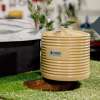13 September 2024
Water Conservation Series – Ensuring Farm Animals Stay Hydrated During Hot and Dry Weather
As the seasons shift, we often either anticipate the change or brace ourselves for the challenges ahead. In regions with hot and or dry climates, its crucial to ensure the well-being of our livestock by keeping them sheltered and hydrated. Just like humans, animals need relief from heat, particularly those who cannot perspire to regulate their body temperature or those with darker skin tone and coats that absorb the heat more.

In this article we will look at some small steps we can take to help make sure our livestock are well cared for with minimal heat stress despite hot and dry conditions we may face.
Whether your farm is small or large, the following steps can help provide respite, especially during warmer months:
- Fresh Water – Animals require twice as much water during the hottest months to prevent stress on their bodily functions.
- Rotational Grazing – Move livestock at specific intervals to encourage healthier root systems that need less water and become hardier during droughts.
- Float Valves – Maintain constant water levels in troughs without wasting water.
- Shade and Wind Protection – Provide shade and reduce wind speed through trees, large shrubs, or built shelters to reduce heat stress and help improve productivity.
- Ground Water – Consider sourcing groundwater or investing in water storage if water sources are scarce.
- Fans – Install fans, possibly with misters, in enclosed areas to improve air circulation. Making the hottest days more manageable.
- Sprinklers – Use sprinklers to reduce external heat in pastures or fields.
- Water Tanks and Troughs – Place these under shade and keep them clean. Animals may need to be shown new water sources if there preferred one dries up.
- Working Livestock – Work livestock during cooler parts of the day, as movement and digestion generate heat.
- Mud and Water Baths – Provide mud baths for pigs and small pools for ducks to help cool them down.
Additional Tips:
- Keep an eye on weather patterns so you can be prepared.
- Consider using electrolytes in extreme weather or to help with heat-affected animals.
What to Do If an Animal is Under Heat Stress:
- Firstly, monitor signs of heat stress: panting, increased respiration, increased salivation, increased water intake, loss of appetite, trembling, stumbling, or disorientation.
- Cool them down by providing shade. If able to be moved preferably a place with a breeze is best or a cool fan.
- Offer plenty of cool water in small amounts.
- Use a damp towel for animals who do not like water. Cool water poured on them can help, but make sure it is cool, not cold.
- Call your vet and if transporting ensure vehicle is not hot.
Ensuring hydration and comfort of farm animals during hot and dry weather is not just a matter of responsibility but also a vital aspect of animal care. By being attentive to their needs and observing signs of heat stress, we can prevent serious health issues. Proactive care helps animals stay healthy and comfortable, allowing them to thrive even in extreme weather conditions. Simple actions can make a significant difference in their well-being.
As the weather starts warming up, we also need to consider our pets so keep an eye out for our follow-on post covering pet's hydration. And if you are on the lookout for a new water trough or water storage solution Orion Australia are here to help. Feel free to check out our range at Orion Products or Contact Us today.


